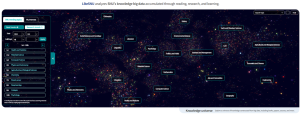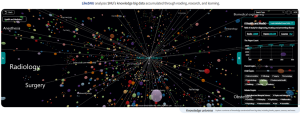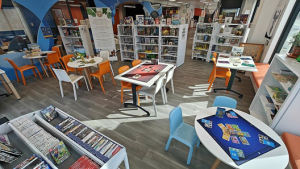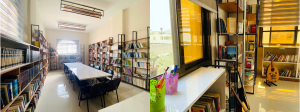The two articles on past IFLA Library of the Year award winners (Helsinki Central Library Oodi in 2019, and Deichman Bjørvika in 2021) made me curious about this year’s winner: the Beijing Library. Described as “75,000 square meters multifunctional community hub” featuring the “he world’s largest climatized reading space”, the library is presented as an ideal melding of the field’s universal, foundational values and innovated, future-oriented design. It’s a gorgeous, truly awe-inspiring library.

[Source: https://www.snohetta.com/projects/beijing-city-library]
Looking at the full list of this year’s four finalists (Four impressive libraries nominated for the IFLA/Baker & Taylor Public Library of the Year Award 2024) and other past winners (IFLA/Baker & Taylor Public Library of the Year Award), I am filled with hope about the future of libraries. At times, it feels like we are fighting against the tide, with budget cuts and trends towards privatization. But these beautiful monuments to the field, from all around the world, prove not only the ability of libraries to change with the times but also the resilience of the field’s founding ideals.
Despite the geographical spread of the awardees, the descriptions of the library spaces and services all follow a similar theme. This no doubt reflects the focus of the award and IFLA’s raison d’etre, but it also genuinely represents global continuity. Despite the vastly different cultural and political contexts both the Missoula Public Library in Missoula, Montana (IFLA/Systematic Public Library of the Year Award 2022 Winner announced) and the Beijing Library are described as vibrant, multifunctional spaces providing a range of resources, rooted in but spreading well beyond traditional library services. Both buildings reflect and respond to the natural landscapes in which they were built. Sustainability, for both of these libraries as well as every other library honored, is a key concept. As examples, they all represent the ideal hyperlinked library: future-oriented and resilient institutions participating in a global project devoted to the betterment of all humankind.
These are beacons. Guiding lights. The award is only available to newly built or significantly renovated and altered library spaces. For examples of smaller scale innovations, programs and services that might feel more in reach of your local library system, there is the American Library Association Presidential Citation for Innovative International Library Projects (ALA Presidential Citation for Innovative International Library Projects). This honors services like the Seoul National University Library’s LikeSNU project, awarded in 2023 (2023 International Innovators), which uses process a vast array of library related data, linking checkout data with collection information to create, among other things, knowledge maps outlining local research trends within specific disciplines and personalized dashboards that provide users with detailed usage data and recommendations.


[Screenshots of LikeSNU’s Knowledge Universe. Source: https://likesnu.snu.ac.kr/usr/userMain.do;jsessionid=8329676E5693B2F86C899F2709747841?lang=en]
And La Bulle (French for The Bubble), awarded in 2022 (2022 International Innovators). Located in Annemasse, France, this is a new consciously constructed “cultural third space”. It is a community focused center, part library, part gathering space, run collaboratively by three groups, including local citizens, elected representatives, and professionals.

[The Bulle Game Library. Source: https://www.annemasse.fr/au-quotidien/culture/la-bulle-accueil/la-bulle-ludotheque]
Then there’s North Gaza’s Edward Said Public Library, founded in 2017 by poet, essayist Mosab Abu Toha (Mosab Abu Toha | The Poetry Foundation). In a 2022 article for Lit Hub (Founding the First English-Language Library in Gaza), Abu Toha recounts the genesis of the library, amidst the horror of the Israeli blockade and campaigns of terror. Born from personal love of the English language, facilitated by the lowly and revolutionary capabilities of the xerox machine, the library expanded from one to two branches in 2019, adding a computer lab to its collection of books. In its simplicity, this represents, more than anything I’ve touched on above, the true resilience of the Library as a borderless, future-oriented institution. To build a library for a community under the thumb of the harshest, most violent kinds of oppression, to build a community space for a community Israeli and American military powers wish to erase requires real vision, real strength, and real hope for the future.

[Photos by Mosab Abu Toha. Source: https://lithub.com/founding-the-first-english-language-library-in-gaza/ ]
This, of course, is now clouded under deep despair. A year into Israel’s genocidal war against the Palestinians, many, if not all of the libraries in Gaza have been significantly damaged or completely destroyed (Israel has damaged or destroyed at least 13 libraries in Gaza). Per a report released by Librarians and Archivists with Palestine (Israeli Damage to Archives, Libraries, and Museums in Gaza, October 2023–January 2024) the Edward Said Public Library is among the list of destroyed. Thankfully, Abu Toha, his wife, and their three children were able to escape. In December 2023, he published the harrowing details of this escape in the New Yorker (Mosab Abu Toha’s Perilous Journey Out of Gaza). A more recent article, from October 2024, The Gaza We Leave Behind, details the depth of Palestinian loss.
Not sure if this strays too far from the hyperlinked model, but it’s been weighing on my mind a lot recently. And I’m ending with this because Mosab Abu Toha’s hope and persistence, as representative of the Palestinian hope and resistance, inspire me than the towering, award winning libraries discussed at the top. The strength and hope required to not only build a library in besieged Gaza but to rebuild and rebuild again after they’ve been destroyed represents the best of humanity.
5 Comments
October 12, 2024 at 6:12 pm
@Louis Thanks for this post. I will update the module with the newest winner!
October 18, 2024 at 3:45 pm
Thank you!
October 13, 2024 at 5:29 pm
@louis It’s so sad to hear (among so many other things) that the Edward Said Public Library was destroyed. This was a very good read, and I enjoyed checking out many of the libraries you linked to.
October 14, 2024 at 10:49 pm
@louis Library design is a really interesting topic; thanks for all the hyperlinks! I read this article by Steffen Lehmann about the Library of the Future and it led me to his book of his about library design.
https://drive.google.com/file/d/1N_VXFV7ELCk39e5IvvrEOyBGYdDUYYwm/view?usp=sharing
https://www.amazon.com/Reimagining-Library-Future-Buildings-Tomorrows/dp/1951541987
You can see the table of contents for the book via the sample on Amazon. I checked the book out from the library and have it here at home. Let me know if you want to see anything; I can scan it in!
October 18, 2024 at 4:08 pm
@arthurkolat
Thanks for the recommendations and the links! Lehmann’s work looks very interesting. The design of a library definitely has a huge impact on how a community views the library. And some of these modern super-libraries find incredible ways of blending classic, traditional models — with stacks and reading rooms and a general feeling of bookiness — with the hyper modern open layouts, where anything feels possible. Especially when the architecture seems to blend into and become one with the urban and natural landscape.